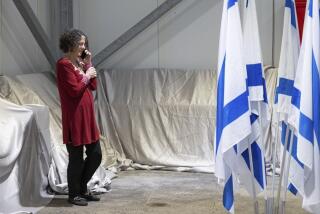Former Hostages Savor First Taste of Newfound Freedom
- Share via
LIMA, Peru — He luxuriated in his first hot bath since December. He savored the taste of foods he’d nearly forgotten.
“I haven’t had butter in four months,” said Father Juan Julio Wicht, smiling with mild astonishment at a breakfast roll that he nibbled Wednesday morning.
Wicht and 70 other hostages basked in their liberty Wednesday, a day after Peruvian commandos freed them from leftist rebels who had held them for more than four months in the Japanese ambassador’s residence here. One hostage, a Peruvian judge, was killed when the residence was stormed.
The survivors talked to wives and children they had feared they’d never see again. Middle-aged men cut off hippie-length hair and shaved off beards. Some, such as Agriculture Minister Rodolfo Munante, sought out a long-impossible thrill: going to the office.
But of all the tales of happy reunions with clan, colleagues and cholesterol, Wicht’s was among the most poignant. Alone among the hostages, the 65-year-old Jesuit priest had voluntarily sacrificed his freedom four months ago--turning down an offer from the rebels to leave the embassy compound with a group of captives being released.
“When I had the possibility to leave . . . there were over 70 hostages. Who would have given them the Eucharist?” asked the slender, chain-smoking priest, dressed in a simple blue shirt and brown slacks.
He seemed astonished Wednesday as dozens of reporters with TV cameras, cellular phones and microphones crowded around him in the cafeteria of the rectory at Our Lady of Fatima church, where he was attempting to down coffee and rolls on his first morning at home.
“I was going to say Mass at 8, but they said journalists are coming from different channels,” the priest said with a shrug.
Wicht, an economics professor, was attending a cocktail party at the Japanese ambassador’s residence Dec. 17 when guerrillas of the Tupac Amaru Revolutionary Movement seized the mansion, taking hundreds of guests prisoner.
Within days, though, the guerrillas began informing groups of captives they’d be freed--the elderly, infirm, dozens of foreigners and other hostages apparently considered less politically influential.
Wicht was one of them. But, pondering his release, he agonized about the men who would be left behind.
“I had doubts. It wasn’t easy,” he admitted. “But God illuminated me.”
He stayed.
Other hostages describe Wicht as an important figure in helping them get through the long days of the siege. He celebrated Mass, provided spiritual counseling and heard confessions--even from the guerrillas. When he handed out rosary beads he received through Red Cross intermediaries, even the rebels asked for some.
Conditions were difficult. Meals, wrapped in plastic and delivered by the Red Cross, were often cold. Drinking water was limited. Sleeping was difficult.
“Above all, I missed freedom,” he said.
Wicht and other hostages tried to distract themselves with chess, board games and books. For the first time, the priest, who usually sticks to tomes on economics and theology, tried Robert Ludlum and other best-selling American authors.
The distractions helped. But on Wednesday he was still marveling at his ability to walk around outside, free from the embassy residence he’d shared with the 14 rebels, fellow captives and the prospect of death.
Amid a volley of questions from journalists, he took moments out to greet fellow priests who had come to see him. The telephone rang with calls from anxious relatives and friends.
Wicht admitted to being extremely tired, and bags were evident under his eyes. But he played down the sacrifice he’d made.
“The other hostages have more merit than I do. They have families, children, responsibilities,” he said. “I was just carrying out my duty.”
More to Read
Sign up for Essential California
The most important California stories and recommendations in your inbox every morning.
You may occasionally receive promotional content from the Los Angeles Times.









